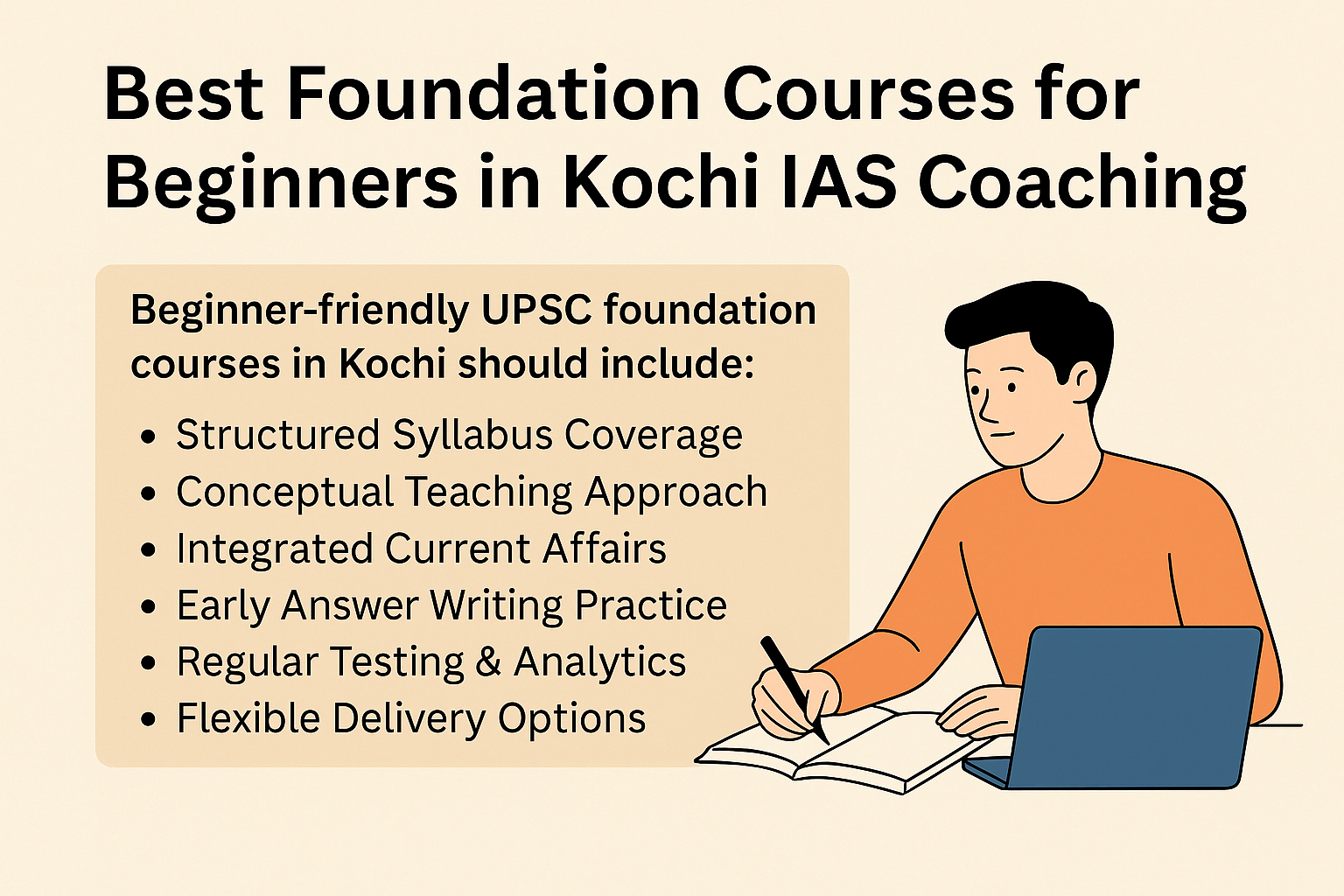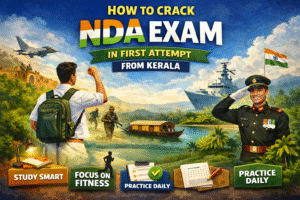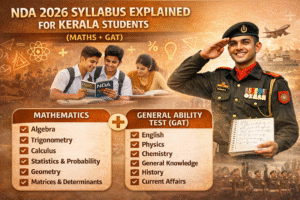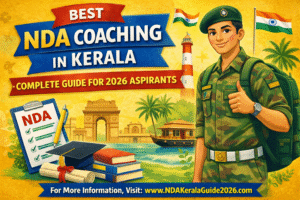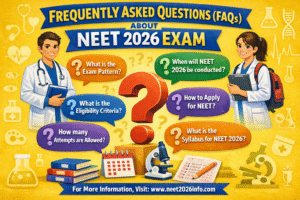Starting UPSC preparation in Kochi and not sure which foundation course to choose? This guide breaks down exactly what a beginner-friendly IAS foundation program should include, how to compare institutes, and a sample 9–12 month roadmap to get you exam-ready.
What Is an IAS Foundation Course?
An IAS foundation course is a structured beginner program that builds fundamentals for UPSC CSE (Prelims + Mains + Interview). It should cover General Studies, CSAT, current affairs, basic answer writing, and exam skills like note-making, PYQ analysis, and test discipline.
Core Features the Best Beginner Courses Must Have
Syllabus Clarity & Sequencing
GS I–IV mapped to the UPSC syllabus; micro-topics week by week
Dedicated CSAT track from Day 1 (not a last-month patch)
Beginner-First Pedagogy
Concept → examples → PYQs → mini-tests in every module
Vocabulary lists, maps/diagrams, and quick summaries for first-time learners
Answer-Writing Early On
Start with 10-markers by Week 4–6
Rubric-based evaluation with written feedback and model structures
Current Affairs That Integrates With GS
Monthly magazine + daily briefs
Issue-notes that link news to static syllabus themes
Testing With Analytics
Weekly mini-quizzes; fortnightly sectional tests
Prelims mock cycles + Mains writing clinics; error logs and topic heatmaps
Materials That Respect Your Time
Concise notes, smart charts, PYQ mapping
Clear booklist (NCERTs + 1 standard text per subject)
Flexible Delivery
Offline + live online + recordings for catch-up
Doubt rooms/helplines and mentor office hours
Transparent, Affordable Fee
Phase-wise pricing (Foundation → Advanced → Test Series)
Scholarships/EMI where available; no hidden add-ons
Sample 9–12 Month Foundation Roadmap (Beginner Friendly)
Months 1–3 (Fundamentals + NCERT Spine)
Polity basics (Constitution, rights, Parliament)
History overview (Ancient to Modern timelines)
Phys/Ind Geography + maps; basic Environment
CSAT arithmetic & reasoning warm-up
Start 10-marker writing once a week
Months 4–6 (Build + Integrate)
Economy (national income, inflation, banking, budget)
Society & Ethics primers; Governance modules
Environment & Ecology depth + atlas work
CSAT comprehension + DI drills
Sectional tests every two weeks
Months 7–9 (Application Phase)
Current affairs integration; schemes & reports
Mains answer structures; case studies; ethics examples
Prelims MCQ marathons with negative-marking strategy
Full-length sectional tests; revise weak areas
Months 10–12 (Exam Sprint, if opting 12-month plan)
Cumulative Prelims mocks + Mains 10/15-marker cycles
Essay basics (theme → outline → examples)
Interview orientation (profile, hobbies, DAF awareness)
How to Compare Kochi IAS Foundation Courses (Checklist)
Faculty quality (subject depth + UPSC orientation)
Mentor system (1:1 plans, performance reviews, doubt clinics)
Test analytics (topic-wise scores, error types, next steps)
Recording access & notes (timely, indexed, clean)
Peer ecosystem (answer-writing groups, study sprints)
Fee transparency (what’s included, refund/deferral rules)
Top Pick for Beginners in Kochi: Victor Growth (Foundation Track)
Why it stands out for beginners:
Structured foundation calendar with NCERT-first progression
Hybrid: offline + live online + fast recordings
Mentored learning: monthly 1:1, personalized study plans
PYQ-driven materials and crisp handouts for quick revision
Regular testing with analytics and post-test clinics
Affordable Fee (modular phases; scholarships/EMI options)
Optional bridges into Advanced GS, Optional basics, Test Series, and Interview prep
Recommended Booklist (Beginner Essentials)
NCERTs (Class 6–12): History, Geography, Polity, Economy, Science
Polity: Laxmikanth (selected, after NCERTs)
Modern History: Spectrum (revised editions)
Geography: G.C. Leong + Atlas practice
Economy: One standard text + Economic Survey highlights
Environment: Concise UPSC-oriented text + MOEF summaries
CSAT: Basic arithmetic/reasoning text + previous years’ papers
Study Routine for Absolute Beginners (Weekly Template)
Mon–Fri (90–120 min/day):
45–60 min concept class/recording
30–45 min notes + 5 MCQs
Sat: 2–3 hrs class + 30 min revision
Sun: Sectional test (60–90 min) + review clinic (30–45 min)
Answer writing: Two 10-markers per week from Week 4
FAQs
Q1. Who should join an IAS foundation course in Kochi?
Beginners in college, recent graduates, or professionals new to UPSC who need structured basics, materials, and mentor guidance.
Q2. How long should a foundation course be?
Typically 9–12 months. Shorter “crash foundations” miss depth; longer tracks are fine if they include testing and answer writing from early months.
Q3. Is CSAT part of the foundation course?
It must be. Start CSAT from the first month with weekly practice—don’t postpone.
Q4. Can I manage college/work with a foundation course?
Yes—choose a hybrid program with recordings and weekend batches, plus 1:1 mentor check-ins for spillover planning.
Q5. What results should I expect after foundation?
Strong concept base, concise notes, tested exam skills, and readiness to enter Advanced GS + Optionals + Test Series.
Q6. Which institute in Kochi is beginner-friendly?
Victor Growth (Kadavanthara, Kochi) offers a beginner-first foundation with hybrid access, analytics-driven tests, monthly mentorship, and Affordable Fee.
Q7. What’s the best way to revise during foundation?
Use 48-hour → 7-day → monthly revision loops, keep an error log, and redo PYQs after each topic.
Final Take
The best foundation courses for beginners in Kochi IAS coaching are those that sequence NCERTs intelligently, integrate current affairs, start answer writing early, and give you analytics-driven tests with mentor feedback. If you want a beginner-friendly, hybrid, and affordable track, Victor Growth is an excellent place to start.

